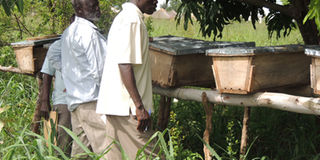Uganda commended on beekeeping

Beekeepers inspect their beehives. Uganda’s apiculture sector is steadily growing.PHOTO BY BRIAN SSENOGA
Uganda has been commended for efforts to improve livelihoods among rural communities while conserving the environment through beekeeping.
Gilles Rattia, president of the International Federation of Beekeepers’ Associations (Apimondia) said Uganda is “an inspiring story of focused progress.” He was speaking at the first Apimondia symposium on African bees and beekeeping held in Arusha, Tanzania. “Uganda is impressive, a private sector-led industry with a lot to learn about. This model, if applied, can work anywhere. They are taking the practice from a tradition to a business.”
He added: “Governments and development partners should not only donate bee hives and equipment but empower farmers to professionally engage in the business. It is not necessary to talk about honey trade and leave out the means of doing business.”
Rattia made the remarks after a presentation about beekeeping by Dickson Biryomumaisho, executive director, The Uganda National Apiculture Development Organisation (Tunado), which focused on the challenges, solutions and progress of Uganda’s apiculture sector in the past decade.
He highlighted the making of a training manual, mobilisation of beekeepers, attainment of standards, an annual exhibition, increased exports and the number of development partners as some of the major achievements.
Share experiences
Biryomumaisho explained, “While most will say there is low honey production in Africa, Uganda’s experience is different. It is the incentive that has always been low. Development partners should help farmers to secure capital and establish systems.”
With an estimated 1.2m beekeepers Uganda produces 2,600 tonnes of honey and exports 1,800 tonnes every year. Information from ministry of agriculture shows that the target is at least 500,000 metric tonnes in the next five year minus other hive products like beeswax, pollen royal jerry and bee venom.
In his opening speech, Peter Mizengo, Tanzania prime minister argued all African countries to share experiences and technical knowledge on how to develop beekeeping in order to improve the livelihood of communities and ensure food security.




